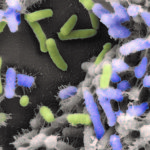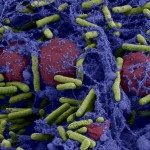Lien vers Pubmed [PMID] – PMID: 27346323
Arch Cardiovasc Dis. 2016 Aug.-Sep;109(8-9)465-475 [Epub 2016 Jun 23]
Abstract
BACKGROUND:
Percutaneous pulmonary valve implantation (PPVI) using the bovine jugular vein Melody® valve (Medtronic Inc., Minneapolis, MN, USA) is safe and effective. However, post-procedural complications have been reported, the reasons for which are unclear.
OBJECTIVE:
To assess the impact of PPVI procedural steps on valvular histology and leaflet mechanical behaviour.
METHODS:
Three different valved stents (the Melody® valve and two homemade stents with bovine and porcine pericardium) were tested in vitro under four conditions: (1) control group; (2) crimping; (3) crimping plus inflation of low-pressure balloon; (4) condition III plus post-dilatation (high-pressure balloon). For each condition, valvular leaflets (and a venous wall sample for Melody® stents) were taken for histological analysis and mechanical uniaxial testing of the valve leaflets.
RESULTS:
Among the Melody® valves, the incidence of transverse fractures was significantly higher in traumatized samples compared with the control group (P<0.05), whereas the incidence and depth of transverse fractures were not statistically different between the four conditions for bovine and porcine pericardial leaflets. No significant modification of the mechanical behaviour of in vitro traumatized Melody® valvular leaflets was observed. Bovine and porcine pericardia became more elastic and less resilient after balloon expansion and post-dilatation (conditions III and IV), with a significant decrease in elastic modulus and stress at rupture.
CONCLUSION:
Valved stent implantation procedural steps induced histological lesions on Melody® valve leaflets. Conversely, bovine and porcine pericardial valved stents were not histologically altered by in vitro manipulations, although their mechanical properties were significantly modified. These data could explain some of the long-term complications observed with these substitutes.


